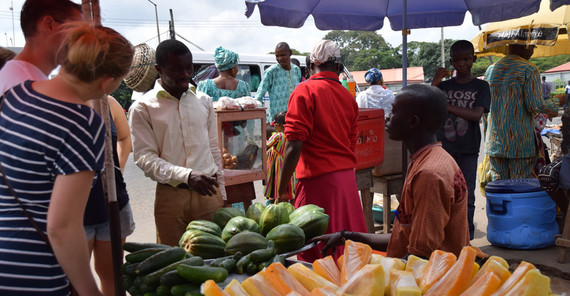October, 8th – Ibadan
Sunday is a big day for Nigerians: People from various confessions dress in their best outfits and spend the whole day participating in services held in the many churches. We were honored to visit a service at the Chapel of Resurrection. It was such an incredible experience because service in Nigeria is full of singing and dancing, which gives the whole church a vibrant atmosphere. We were also treated like special guests, were accommodated to the first row and even received gifts! The sermon was of particular interest to those among us who study linguistics. It was held by two pastors, and while we understood the older one pretty well, we kept catching ourselves at losing track of what the younger one was saying. Prof. Dr. Wolf solved this mystery after the service was over: part of the sermon was actually in Pidgin English. Pidgin English is a variety of English that combines certain aspects like vocabulary of a dominant language with grammatical structures of a subordinate language. This hybridization of languages happens in places of language contact, e.g., often as a result of colonization, as is the case in Nigeria.After the service some of us made friends with a university student called Itsuru (we honestly struggled trying to pronounce his name correctly). He took us outside the premises to buy fruit from the local salesmen. It was just a few dozen meters away from the campus, but what a difference! Two begging children clang to us and in general, we attracted loads of attention from all around. We were also approached from a few curious children wondering whether we were Americans and a nice lady who invited us - guess where - to her church! Without any doubt, religion and faith are a major part of life in Nigeria.Following our little adventure of buying fruit outside of the university gates, Itsuru and his friend Lekan were happy to engage in a small language exchange. We taught them some German and they helped us to grasp grammar structures and vocabulary of the local language called Yorùbá. For example, we learned that it only takes one high-rising (!) tone to let a farm turn into a penis. The Yorùbá word for farm is oko and the one for penis okó. Since Yorùbá is a tonal language, just like Chinese or Thai, it’s quite hard for us to detect the difference. We struggled quite a bit to pronounce both version of the word properly, which was followed by laughter of the Nigerians around. Apart from these pronunciation difficulties, we also learned expressions like ‚good morning‘ (ekaaro) and ‚thank you‘ (ẹṣe).
Text: Sandra Hesse, Anna Korneva und Valerie Pobloth
Online gestellt: Alina Grünky
Kontakt zur Online-Redaktion: onlineredaktionuuni-potsdampde

